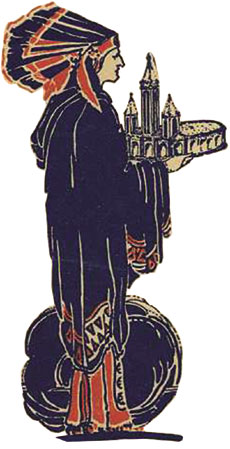‘Illini’ named for state, not natives

Image from one of the first known references to the “Fighting Illini,” a fundraiser for Memorial Stadium. Courtesy of University of Illinois Archives Online Poster
Sep 2, 2005
In January, 1874, The Illini newspaper issued a statement explaining it’s name change. It is the first known use of “Illini” in reference to the University. The text of that editorial follows:
“And then, like a rosie-cheeked bride, we are all aglow over our new name. Had you noticed it? Did you ever see it before? Do you know what it means and where it comes from? Sound it ‘tripping on the tongue.’ Accent the second syllable and pronounce with us, Il-li-ni. Good! Try, try again until it fits the tongue as well as Illinois, simply a Frenchman’s translation of the same word. Here ambition steals away our modesty and with a thrill of excitement we hopefully query: Shall our name be known in future time as far and wide as that of the broad, fair State we honor and shall it be cherished and loved like that? Shall generation after generation pass and find unfailing stories of richness and worth? Shall cultivation beatify our appearance and cause abundant harvests of choicest fruitage? Illinois! queen of the Union, we place upon thy fair brown the diadem of the States; ILLINI! – ah! what will others say? We wait and wonder and away to work. Good-by Student. Pleasant memories linger with thy name. Many, many thanks to our old editors. We shall not say good-by, come to see us often and stay long.”
The truth is, it’s all our fault.
In 1874, The Student, Illinois Industrial University’s student-run newspaper, changed its name. The new tag chosen was “The Illini.”
“The Illini” was a monthly publication, which later became the Daily Illini. Illinois Industrial University is now the University of Illinois.
Get The Daily Illini in your inbox!
The editorial board of The Student changed the paper’s title in order to better reflect the identity of the student body. “The Illini,” the editors thought, was a French translation of “Illinois.”
“Shall our name be known in future time as far and wide as that of the broad fair state we honor, and shall it be cherished and loved like that?” the editors queried in an editorial explaining the alteration. It is the first known use of the word in application to Illinois’ flagship university.
“At least in my mind, there’s fairly good evidence that it started there,” said Chris Prom, assistant University archivist. “Why it started or who developed it we don’t know, but we do know that 1874 is pretty much the date.”
One-hundred-thirty-one years later, “Illini” is used interchangeably with “Illinois” in describing many elements of the University community. Illinois’ athletic teams adopted the phrase at least 90 years ago. A minimum of 80 Registered Student Organizations now employ “Illini” in their titles. Around Champaign-Urbana, businesses from the Illini Union to the Illini Inn to the Illini Express associate themselves with the now University-wide moniker.
“If you look back through Daily Illinis or through Illio, the campus yearbook, you would see the word used frequently, and it was always intended to apply to the campus as a whole, to students, faculty members, and specifically to alumni,” Prom said. “The alumni thought of themselves as Illini.”
On Dec. 8, 1882, The Illini issued a second editorial devoted to its title, saying, “Illini is but another form of the Indian word Illinois, and has the same meaning, i.e. ‘real men.'”
Illinois is one of 27 states with names derived from American Indian words.
“The originators of the paper might have searched the world over and would have found no better name than that of our great state,” the editorial declared.
It was not until later, and in reference to Illinois’ athletic teams, that the “Fighting” adjective was attached to the name. While the exact origin of the term is unclear, it is frequently traced to two early-20th century points.
The first possible use of “fighting” may have been in reference to legendary coach Bob Zuppke’s successful 1919 football team, which finished its season 6-1 and in first place in the Big Ten.
“It was a reference to some pretty scrappy football teams at the beginning of the century, the 1919 team especially was known for coming from behind, being spirited,” University spokesman Tom Hardy said. “That’s one of the definitions of ‘fighting,’ to strive for success, determination.”
Another likely origin of “fighting” is in reference to those Illini alumni, students, staff and friends who fought and died in World War I. When the University issued a call for funds to build Memorial Stadium, it did so with the intent of dedicating the stadium to those Illini who lost their lives in that campaign.
“That’s the Fighting Illini everybody associated with the term; that spirit and determination to achieve a goal,” Hardy said.
Whichever is correct, Illinois’ teams are not the only ones to attach “fighting” to their nickname. Programs from South Carolina’s Fighting Gamecocks to the Carroll College Fighting Saints have employed the same word, which dictionary.com says means “to contend with physically or in battle,” or “to wage or carry on (a battle).”
Both names also predate the Chief Illiniwek symbol by at least five years. The Chief was first introduced in 1926, 52 years after the newspaper’s name change.
While early twentieth-century editions of the Daily Illini – including many predating Chief Illiniwek’s introduction – refer to Illinois’ athletic teams as “Indians,” that term eventually dropped from common use.
Today, the term “Illini” is employed when referring to many things associated with the University, including sports teams, campus buildings and organizations, and, 131 years after the original name change, the Daily Illini.
For more info visit the University Archives at
http://web.library.uiuc.edu/ahx/illini





